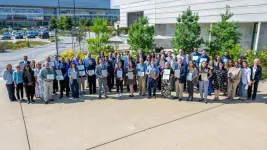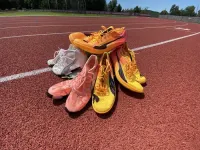(Press-News.org) DALLAS (SMU) – When SMU researcher Alexander Chase was a young boy, the sheer diversity of plants in Earth’s tropical rainforests fascinated him. He found himself wondering, what new species were out there, waiting to be unearthed? That curiosity is why Chase now collects samples from Earth’s oceans using a new technique called Small Molecule In situ Resin Capture (SMIRC), which could be the first step in uncovering compounds that lead to next-generation antibiotics.
Microbial natural products come from microorganisms, or microbes, and account for many of today’s essential medicines, including most antibiotics. Microbes are too small to see without a microscope and produce a wide variety of chemical compounds as part of their lifespan, some of which are useful for pharmaceutical applications. Traditionally, these compounds are discovered using a ‘microbe-first’ approach, where individual strains are cultured in the laboratory from a sample picked up in the wild.
While this method has been effective, it has become increasingly difficult for researchers to use it to uncover new chemical “scaffolds”, which serve as the foundation upon which chemical compounds are built. Chemical scaffolds are a critical resource for drug discovery.
“Right now, when we collect new samples and culture the microbes, we’re discovering scaffolds that essentially are very similar to the ones we already know about,” explains Chase, an assistant professor in the Roy M. Huffington Department of Earth Sciences. “It’s been really difficult over the last few decades to find something that is new with the ‘microbe-first’ approach, which essentially limits us to the same or similar bacterial strains and their chemical compounds that represent only a fraction of the natural diversity out in the ocean. That’s where SMIRC comes in, it allows us to explore the unknown.”
A recent study in the journal Nature Communications by Chase and researchers at the University of California San Diego and University of California San Francisco explains how SMIRC made possible the collection of microbial natural products where they are produced in the wild, without the need to be cultured in a lab. It used an absorbent resin called HP-20, which acts like a sponge to capture the chemicals released by microbes.
As a test, the researchers used SMIRC in areas covered in seagrass near San Diego. From the chemicals collected, they found an antibiotic compound and also a chemical called chrysoeriol, which is plant-based that has antibacterial properties. A modified version of SMIRC was then used by mixing the HP-20 with agar, a substance that encourages the growth of microbes. This second experiment uncovered aplysiopsene A, which showed continued success of the SMIRC technique for recovering compounds.
A third test used SMIRC in a protected marine reserve at Cabrillo National Monument. Here the technique collected larger samples that contained more complex chemical mixtures. While the reason for the site to be rich in novel compounds is currently unknown, the researchers speculate it could be because this specific area is exposed to little human traffic.
Although none of the new compounds proved to be a path to new antibiotics, one of the compounds discovered, dubbed cabrillostatin, does show bioactivity and is being pursued as a possible new approach to cancer and heart care.
“The ocean is one of the least explored areas on Earth, especially the deep ocean,” said Chase. “There’s so much we don’t understand about marine microorganisms and the compounds they produce. Because of antibiotic resistance and other health challenges, there is a high priority for natural product research. With SMIRC, we now have an easily deployable system that makes it possible for researchers to study compounds previously out of reach.”
About SMU
SMU is the nationally ranked global research university in the dynamic city of Dallas. SMU’s alumni, faculty and more than 12,000 students in eight degree-granting schools demonstrate an entrepreneurial spirit as they lead change in their professions, communities and the world.
END
SMU researcher helps develop new technique to explore oceanic microbes
Known as SMIRC, the technique could uncover new antibiotics
2024-09-04
ELSE PRESS RELEASES FROM THIS DATE:
New guideline for Helicobacter pylori includes change to primary treatment recommendation
2024-09-04
The American Journal of Gastroenterology has published a new guideline on the treatment of Helicobacter pylori (H. pylori) infection.
The corresponding author on the guideline is William D. Chey, M.D., chief of the Division of Gastroenterology and Hepatology at Michigan.
H. pylori is a bacterium that infects over half the people in the world, though most are asymptomatic.
It can cause dyspepsia, peptic ulcer disease and gastric cancer.
This latest clinical practice guideline notes that its prevalence in North America is decreasing, but it still infects 30-40% of the population.
A previous guideline ...
Making desalination more efficient, by way of renewable energy
2024-09-04
(Santa Barbara, Calif.) — With freshwater becoming an ever scarcer resource, desalination of ocean water is increasingly employed to bridge the gap between supply and demand. However, desalination is energy-intensive, often powered by fossil fuels, so meeting the need for freshwater can exacerbate the challenge of reducing atmospheric CO2, the main driver of climate change.
Yangying Zhu, an assistant professor in the Department of Mechanical Engineering at UC Santa Barbara, wants to address that conundrum. Now, a two-year, $500,000 seed grant from the Advanced Research Projects Agency-Energy (ARPA-E) ...
Preventing car battery fires with help from machine learning
2024-09-04
One of the most critical safety concerns for electric vehicles is keeping their batteries cool, as temperature spikes can lead to dangerous consequences.
New research led by a University of Arizona doctoral student proposes a way to predict and prevent temperature spikes in the lithium-ion batteries commonly used to power such vehicles.
The paper "Advancing Battery Safety," led by College of Engineering doctoral student Basab Goswami, is published in the Journal of Power Sources.
With the support of $599,808 from the Department of Defense's Defense Established Program to Stimulate Competitive Research, Goswami and his adviser, aerospace ...
Heavy metal cadmium may be tied to memory issues for some
2024-09-04
MINNEAPOLIS – The heavy metal cadmium, which is found in the air, water, food and soil, is known to cause health problems. A new study published in the September 4, 2024, online issue of Neurology®, the medical journal of the American Academy of Neurology, examined if thinking and memory skills were associated with cadmium exposure. They found no association when they looked at the group as a whole. However, when looking at Black and white people separately, it found cadmium may be tied to problems with thinking and memory skills in white people. ...
Strictest abortion-ban states offer least family support
2024-09-04
View a breakdown of the abortion restrictions by state below
States with early abortion bans are less likely to offer paid time off after childbearing, to give poor children nutritional support or to expand access to reproductive health care
Marginalized people and those with low socioeconomic status are overrepresented in ban states and least likely to overcome the barriers that bans impose
CHICAGO --- States with the most severe post-Dobbs abortion restrictions also have the fewest policies in place to support raising families, reports a new Northwestern Medicine study.
“We found that in the states that most severely ...
Study: People facing life-or-death choice put too much trust in AI
2024-09-04
In simulated life-or-death decisions, about two-thirds of people in a UC Merced study allowed a robot to change their minds when it disagreed with them -- an alarming display of excessive trust in artificial intelligence, researchers said.
Human subjects allowed robots to sway their judgment despite being told the AI machines had limited capabilities and were giving advice that could be wrong. In reality, the advice was random.
“As a society, with AI accelerating so quickly, we need to be concerned about the potential for overtrust,” said Professor Colin ...
Leaders of ‘EV Ready’ Illinois cities recognized in ceremony at Argonne
2024-09-04
City leaders who are working to accommodate more electric vehicles (EVs) were recognized in a ceremony o Aug. 23 at the U.S. Department of Energy’s (DOE) Argonne National Laboratory. Utility ComEd and the Metropolitan Mayors Caucus spotlighted 12 communities in northern Illinois that recently completed the EV Readiness Program.
The EV Readiness Program trains and assists local government officials in taking concrete steps to support EV adoption. As a national leader in EV research, ...
Survey shows nearly 70% of US hospitals affiliated with medical schools host a fast-food restaurant; Chick-fil-A, McDonald’s among most common
2024-09-04
WASHINGTON, D.C.—A new survey by the Physicians Committee for Responsible Medicine published in the American Journal of Lifestyle Medicine reveals that 69.2% of U.S. hospitals affiliated with a medical school host at least one fast-food restaurant. The five most common fast-food restaurants located in hospitals were Starbucks, Subway, Chick-fil-A, Au Bon Pain, and McDonald’s.
“Making fast food like cheeseburgers and fried chicken available in hospitals is hazardous to the health of patients, visitors, and staff,” says Zeeshan Ali, PhD, the lead author of the paper and a nutrition program specialist with the Physicians Committee. “Hospitals ...
Study solves testosterone’s paradoxical effects in prostate cancer
2024-09-04
DURHAM, N.C. – A treatment paradox has recently come to light in prostate cancer: Blocking testosterone production halts tumor growth in early disease, while elevating the hormone can delay disease progression in patients whose disease has advanced.
The inability to understand how different levels of the same hormone can drive different effects in prostate tumors has been an impediment to the development of new therapeutics that exploit this biology.
Now, a Duke Cancer Institute-led study, performed ...
New UMass study shows that ‘super spikes’ can increase track running speed by 2%
2024-09-04
New research published in the Journal of Sport and Health Science led by the University of Massachusetts Amherst shows that super spikes, scientifically described as advanced footwear technology (AFT) spikes, can give runners about a 2% edge in middle-distance track races, like the 800- and 1,500-meters.
“Track athletes started wearing super spikes about five years ago and they are now commonplace in elite track races,” says Wouter Hoogkamer, assistant professor of kinesiology at UMass Amherst and senior author ...
LAST 30 PRESS RELEASES:
ASU researchers showcase scalable tech solutions for older adults living alone with cognitive decline at AAAS 2026
Scientists identify smooth regional trends in fruit fly survival strategies
Antipathy toward snakes? Your parents likely talked you into that at an early age
Sylvester Cancer Tip Sheet for Feb. 2026
Online exposure to medical misinformation concentrated among older adults
Telehealth improves access to genetic services for adult survivors of childhood cancers
Outdated mortality benchmarks risk missing early signs of famine and delay recognizing mass starvation
Newly discovered bacterium converts carbon dioxide into chemicals using electricity
Flipping and reversing mini-proteins could improve disease treatment
Scientists reveal major hidden source of atmospheric nitrogen pollution in fragile lake basin
Biochar emerges as a powerful tool for soil carbon neutrality and climate mitigation
Tiny cell messengers show big promise for safer protein and gene delivery
AMS releases statement regarding the decision to rescind EPA’s 2009 Endangerment Finding
Parents’ alcohol and drug use influences their children’s consumption, research shows
Modular assembly of chiral nitrogen-bridged rings achieved by palladium-catalyzed diastereoselective and enantioselective cascade cyclization reactions
Promoting civic engagement
AMS Science Preview: Hurricane slowdown, school snow days
Deforestation in the Amazon raises the surface temperature by 3 °C during the dry season
Model more accurately maps the impact of frost on corn crops
How did humans develop sharp vision? Lab-grown retinas show likely answer
Sour grapes? Taste, experience of sour foods depends on individual consumer
At AAAS, professor Krystal Tsosie argues the future of science must be Indigenous-led
From the lab to the living room: Decoding Parkinson’s patients movements in the real world
Research advances in porous materials, as highlighted in the 2025 Nobel Prize in Chemistry
Sally C. Morton, executive vice president of ASU Knowledge Enterprise, presents a bold and practical framework for moving research from discovery to real-world impact
Biochemical parameters in patients with diabetic nephropathy versus individuals with diabetes alone, non-diabetic nephropathy, and healthy controls
Muscular strength and mortality in women ages 63 to 99
Adolescent and young adult requests for medication abortion through online telemedicine
Researchers want a better whiff of plant-based proteins
Pioneering a new generation of lithium battery cathode materials
[Press-News.org] SMU researcher helps develop new technique to explore oceanic microbesKnown as SMIRC, the technique could uncover new antibiotics





